Eshan Regmi / Nepal
“Transgender is a gender identity. Being lesbian or gay is sexuality. Not just in the outside world but also in the LGBTIQ community there is a lot of confusion on Gender, Sex and Sexuality. Because in public documents, Nepali government has specified male, female and third sex. Third sex is not the sex but sexuality. Because sex is biological identity. Male female is biological and so is intersex, but people don’t have knowledge about it. Its not that it is inappropriate to talk about sex, gender and sexuality with transgender and gays and lesbians. We need to talk about sex because gays and lesbian are confused as transgender. Intersex is a biological identity. Intersex people’s sexual orientation, gender identity can be anything. Intersex is not gender identity. In many places the ‘I’ is kept separate from LGBTI. But within the I—the same way man and women can have different sexual orientation and gender identity—its the same with an Intersex person.”




